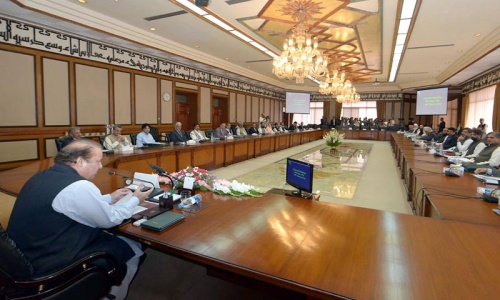ISLAMABAD: The federal government has decided to put in place an upfront transmission tariff regime to enable private entities and provincial governments to set up independent power projects for their own energy needs and to inject surplus electricity into the national grid.
The move would greatly facilitate, particularly the provincial governments, to set up large power plants not only for their own requirements but also to sell surplus electricity to the National Transmission and Dispatch Company (NTDC).
A couple of years ago the Council of Common Interests (CCI) had empowered the provincial governments to set up independent power plants as allowed under the Constitution. But in the absence of an enabling regulatory framework, the private investors were shy of signing power production agreements with the provincial governments. So despite having legal and constitutional powers and a lot of surplus cash at their disposal following increased shares from the National Finance Commission (NFC), the provincial governments were practically handicapped to add power generation capacity to the national grid even for their own needs.
Now, the federal government has instructed the National Electric Power Regulatory Authority (Nepra) under policy guidelines permissible under the Nepra Act of 1997 to design transmission tariff, commonly known as tolling charges, to enable any entity to evacuate its electricity generation through the national grid at cost, according to documents seen by Dawn.
Ultimately, the power producers — whether private investors or provincial or local entities — will be able to produce as much electricity as they can and send it out through the national grid to customers of their choice by paying a certain tolling or wheeling charge to the NTDC. This charge would be pre-determined by Nepra.
As a result, transmission charges will become a regulated instrument for the transmission company to recover the revenue requirement allowed by the regulator to provide transmission service within the required transmission reliability and performance standard obligation through allocation of permissible transmission losses in the tariff. In other words, the transmission users would use the transmission system of the NTDC at a price and deliver electricity to the consumers.
This will also enable the NTDC to expand its transmission system to provide a platform for electricity buyers and sellers to trade electricity on the pattern of a stock exchange or commodity exchange, instead of waiting for the federal government to make allocations in the public sector development programme (PSDP).
This is important because major chunks of the transmission system — lines, feeders, transformers and grids — have become obsolete, causing huge system losses, rampant breakdowns and restricting investors from investing in the transmission system.
Nepra has been instructed to accelerate the NTDC tariff determination by ensuring that the expansion plan is proposed by the NTDC itself and hold early hearings for these plans and tariffs.
The regulator has also been asked to ensure that transmission tariff regime or tolling charges are announced every year or through a multi-year tariff petition ahead of tariff petitions of the distribution companies.
It would also specify a five-year expansion plan for NTDC and a grid code for interconnection facilities for power producer, transmitter, distributor and the end consumer.
Punjab has already announced plans for 6,000MW of ‘affordable electricity’ to the national grid, including from solar power plants of about 1,000MW. To this end, the provincial government has recently sought expression of interests from private investors for coal-based power projects at six selected sites across the province.
Sindh is following suit, mostly with proposed electricity generation from Thar while Khyber Pakhtunkhwa is independently setting up hydropower projects, not only to meet their own electricity requirements but also to increase their revenues through sale of surplus energy to the national grid or the NTDC.












































